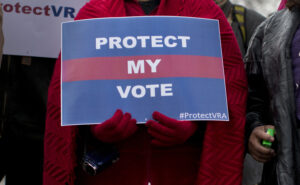Five States Where Voters Can Change the Criminal Justice System
Ballot initiatives seek reforms for laws on policing, prosecution, mass incarceration and other issues. Several of the state measures to be voted on in November attempt to change laws with roots in the Jim Crow era.
Several of the state measures to be voted on in November attempt to change laws with roots in the Jim Crow era.
On Nov. 6, five states will vote on ballot initiatives that, if passed, will enable their citizens to attain greater accountability from police, prosecutors and other law enforcement officials. Proposals range from restoring voting rights to the formerly incarcerated, to abolishing slavery as a punishment for a crime, to reducing the punishments for drug possession. Many of these rules have roots in Jim Crow-era structural racism, and voters in these states will have a chance to change the way the criminal justice system works.
1. Louisiana Louisiana is the only state in which a split jury with 10 members in agreement and two in disagreement can convict someone of murder. Amendment 2 would repeal this 1898 law and require juries to render a unanimous verdict to convict a defendant of a felony.
The New Orleans Advocate finds that the law negatively affects black people by allowing judges to silence dissenting jurors. It additionally reports that juries in Louisiana tend to be disproportionately white—and black jurors are more than twice as likely as white jurors to disagree with a jury’s majority opinion. On average, a split jury’s decision sends a person to prison in Louisiana every five days, the Advocate reports.
“This is something that is wholly unnecessary that was born of this fusion of racism and disenfranchisement,” said Democratic state Sen. J.P. Morrell. “It’s a self-defeating, illogical position to have two jurors say, ‘We don’t think he did it,’ then prosecutors to say we met our reasonable doubt standard.”
2. Washington
Washington state’s Initiative 940 seeks to reduce police violence and hold law enforcement accountable by changing the standards by which the state prosecutes fatal shootings by police. In Washington today, prosecutors must show a police officer acted with “evil intent” to convict, making it nearly impossible to prosecute law enforcement personnel for killing someone. The initiative suggests a “good faith” standard instead, allowing for greater legal scrutiny.
This initiative would require an independent investigation after a police officer kills or seriously injures a person. It also would require that police receive training in de-escalation, first aid and mental health. Finally, it would require that tribal governments be included in investigations when a member of the tribe is injured or killed.
The Seattle Police Officer’s Guild has spent $100,000 opposing the measure, according to state lobbying filings. The Vancouver, Tacoma and Spokane police guilds have given money to oppose the initiative as well.
3. Florida
Florida’s Amendment 4 would restore the right to vote to an estimated 1.6 million people who were previously convicted of a felony, with the exception of murder or sexual violence, who have completed their prison sentences, parole and probation. Today, former felons in Florida must wait five to seven years to apply to the state clemency board, which meets four times a year. The board then decides whether applicants can vote, serve on a jury or run for public office. Since Republican Gov. Rick Scott took office in 2011, only 3,200 people have had their civil rights restored. By comparison, from 2007 to 2011, then-Republican Gov. Charlie Crist restored the voting rights of more than 155,000 people.
“Our penal system is the means by which lawbreakers are to satisfy their debt to society. To continue to punish these individuals after they have fully served their sentences seems needlessly punitive,” said Jaret Davis, an attorney in Miami. “By disenfranchising more than 1 million Florida residents, we make it impossible to ever truly have a representative democracy.”
“A person’s right to vote has been a political football, where your right to vote can depend upon who’s in office and what they feel like that day,” said Myrna Pérez of NYU’s Brennan Center for Justice. “Part of the beauty of the amendment is that it sets forth a clear standard that people understand that doesn’t have to deal with whim or discretion, but will actually be an across-the-board applied rule.”
4. Ohio
Issue 1 in Ohio attempts to reduce the number of people who are incarcerated for low-level, nonviolent crimes. Crimes related to the possession and use of drugs, including the opioid fentanyl, a leading cause of overdose deaths, would be no more than misdemeanors. Incarcerated people would have the option to reduce their sentences through education or treatment programs.
According to analysis from the think tank Policy Matters Ohio, “Issue 1 would divert more than 10,000 Ohioans from expensive incarceration, treating them instead in the community, where they can better participate in work and family life. This would free up more than $136 million in the first year of full implementation.”
“There is so much investment in punishing people and locking them up in prison cells and so little investment in healing those people who need to transform their lives,” said the Ohio Justice and Policy Center’s Stephen JohnsonGrove.
Facebook founder Mark Zuckerberg’s The Chan Zuckerberg Initiative and investor George Soros’ Open Society Policy Center have each given $1 million in support of Issue 1.
5. Colorado
The 13th Amendment to the U.S. Constitution and more than a dozen state constitutions (including Colorado’s) contain a clause that allows slavery as punishment for someone who has been convicted of a crime. Colorado Amendment A would clarify that “there shall never be in this state either slavery or involuntary servitude.” The legislation would not affect below-minimum-wage prison workers, because they do receive payment, however small. Rather, the amendment focuses on future scenarios.
According to Nathan Woodliff-Stanley, director of the American Civil Liberties Union of Colorado: “It would not necessarily violate our constitution for prisoners to be bought and sold for slave labor by public or private prisons, or even put on the auction block and sold as slaves to the highest bidder, as long as it could be defined as a punishment for crime. We may think that could never happen, but in the context of today’s national politics, it is hard to feel comforted just by an assumption that something will never happen.”
Your support matters…Independent journalism is under threat and overshadowed by heavily funded mainstream media.
You can help level the playing field. Become a member.
Your tax-deductible contribution keeps us digging beneath the headlines to give you thought-provoking, investigative reporting and analysis that unearths what's really happening- without compromise.
Give today to support our courageous, independent journalists.






You need to be a supporter to comment.
There are currently no responses to this article.
Be the first to respond.